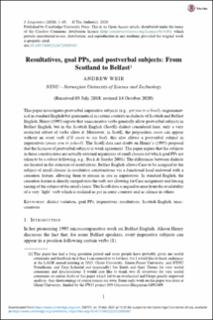| dc.contributor.author | Weir, Andrew | |
| dc.date.accessioned | 2021-03-18T11:39:26Z | |
| dc.date.available | 2021-03-18T11:39:26Z | |
| dc.date.created | 2020-10-14T16:59:58Z | |
| dc.date.issued | 2022 | |
| dc.identifier.issn | 0022-2267 | |
| dc.identifier.uri | https://hdl.handle.net/11250/2734171 | |
| dc.description.abstract | This paper investigates postverbal imperative subjects (e.g., get you to school), ungrammatical in standard English but grammatical in certain contexts in dialects of Scottish and Belfast English. Henry (1995) reports that unaccusative verbs generally allow postverbal subjects in Belfast English, but in the Scottish English (ScotE) dialect considered here, only a very restricted subset of verbs allow it. Moreover, in ScotE, the preposition away can appear without an overt verb (I’ll away to my bed); this also allows a postverbal subject in imperatives (away you to school). The ScotE data cast doubt on Henry’s (1995) proposal that the licensor of postverbal subjects is weak agreement. The paper argues that the subjects in these constructions are actually external arguments of small clauses (of which goal PPs are taken to be a subset following, e.g., Beck & Snyder 2001). The differences between dialects are located in the structure of resultatives; Belfast English allows Case to be assigned to the subject of small clauses in resultative constructions via a functional head endowed with a causation feature, allowing them to remain in situ in imperatives. In standard English, the causation feature is directly merged onto the verb, not allowing for Case assignment and forcing raising of the subject of the small clause. The ScotE data is argued to arise from the availability of a very ‘light’ verb which is realized as get in some contexts and as silence in others. | en_US |
| dc.language.iso | eng | en_US |
| dc.publisher | Cambridge University Press | en_US |
| dc.rights | Navngivelse 4.0 Internasjonal | * |
| dc.rights.uri | http://creativecommons.org/licenses/by/4.0/deed.no | * |
| dc.title | Resultatives, goal PPs, and postverbal subjects: From Scotland to Belfast | en_US |
| dc.type | Peer reviewed | en_US |
| dc.type | Journal article | en_US |
| dc.description.version | publishedVersion | en_US |
| dc.source.volume | 58 | en_US |
| dc.source.journal | Journal of Linguistics | en_US |
| dc.identifier.doi | https://doi.org/10.1017/S0022226720000407 | |
| dc.identifier.cristin | 1839665 | |
| cristin.ispublished | false | |
| cristin.fulltext | postprint | |
| cristin.qualitycode | 2 | |

